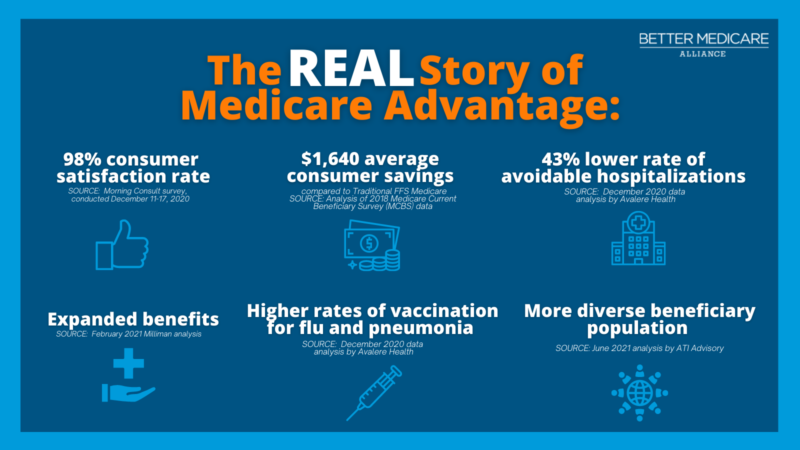
Setting the Record Straight on Axios’s Recent Coverage of Medicare Advantage
By Jonathan Frank
As Medicare Advantage continues to grow – driven by diverse, medically complex, and at-risk beneficiaries who make an active choice to enroll – so, too, does the outcry from those with an interest in protecting the flawed Fee-for-Service status quo.
In recent months, we have seen anti-Medicare Advantage interests rachet up their rhetoric; misleading seniors with claims about Medicare Advantage’s costs, benefits, and consumer protections.
These attacks aren’t deterring beneficiaries, who give Medicare Advantage a 98% satisfaction rating, nor are they persuasive to most lawmakers: 75% of Congress signed letters affirming support for Medicare Advantage last year, and Secretary of Health and Human Services (HHS) Xavier Becerra recently committed to “safeguard Medicare Advantage so that it remains a strong, successful program.” Still, misinformation about something as personal as seniors’ health coverage deserves a response.
The latest criticisms came from Axios reporter Bob Herman in an August 11 article titled, “Medicare has become more of a private marketplace – and it’s costly.”
The article expresses concerns about Medicare Advantage’s continued growth and success while offering fact-free warnings of “deep, longstanding problems.” Let’s consider several of the author’s claims:
“A Fundamental Change in the Architecture of Medicare” – The article raises concerns that the success of Medicare Advantage is shifting Medicare away from its original design. In truth, Medicare has changed in many ways since its enactment in 1965. For example, it was amended to allow coverage for individuals with certain disabilities in 1973, and again in 2003 to add Part D prescription drug coverage. Medicare Advantage has existed for nearly 25 years.
Today, a diverse cross-section of beneficiaries, policymakers, and advocates agree that Medicare Advantage is essential to fulfilling the Medicare guarantee. A December 2020 poll of more than 1,000 seniors on Medicare found that 95% of respondents agreed it was important for beneficiaries to have a choice of plans other than Traditional Medicare, including 64% who believe it is very important.
Spending on Medicare Advantage – The article claims that “annual spending growth on MA plans has outpaced annual enrollment growth” but leaves out important context. In recent years, Medicare Advantage has seen a sharp increase in enrollment among medically complex, socially at-risk, dual-eligible, and minority beneficiaries who present unique health care needs.
Consider that the number of Medicare Advantage beneficiaries who are dually eligible for Medicare and Medicaid increased 125% from 2013 to 2019, even as the number dropped by 5% during the same period in Traditional FFS Medicare. The latest Medicare Current Beneficiary Survey (MCBS) data show that 52.7% of all Medicare Advantage beneficiaries live below 200% of the Federal Poverty Level, compared to 39.1% in Traditional FFS Medicare.
What’s more, research from Avalere Health found that Medicare Advantage beneficiaries with chronic conditions are 64% more likely to enroll in Medicare due to disability, have a 57% higher rate of serious mental illness, and have a 16% higher rate of alcohol, drug, or substance abuse. Separate findings from ATI Advisory report that “a greater percentage of beneficiaries enrolled in Medicare Advantage report having more than three chronic conditions.”
Such reporting on Medicare Advantage spending without mention of enrollment demographics and beneficiary needs offers readers an incomplete understanding of the facts.
No Savings for the Medicare Program? – The author goes on to argue that Medicare Advantage is not effectively saving public dollars for the Medicare program, but fails to mention the savings it delivers to the most important audience: beneficiaries. Medicare Advantage beneficiaries save an average of $1,640 a year in total health costs compared to their Traditional FFS Medicare counterparts, according to an analysis by ATI Advisory. This results in a 40% lower rate of cost burden than Traditional FFS Medicare.
Moreover, the reporting neglects to consider what the health care system receives as a return on its investment in Medicare Advantage, as compared to Traditional FFS Medicare. For roughly the same cost to the federal government, Medicare Advantage delivers a host of expanded benefits, a 43% lower rate of avoidable hospitalizations, a 5% lower rate of readmissions, and higher rates of primary care, preventive care, and screenings than Traditional FFS Medicare. This includes higher rates of flu vaccinations, pneumonia vaccinations, risk falls assessments, prostate cancer screenings, depression screenings, and more. These findings are detailed in a December 2020 report with data analysis from Avalere Health available here.
“A More Narrow Network” – The article editorializes here to claim that provider networks in Medicare Advantage “limit access to the doctors, hospitals, nursing homes, and hospice care they [beneficiaries] want.” The truth? Morning Consult polling shows that 97% of Medicare Advantage beneficiaries are satisfied with their selection of doctors, hospitals, and specialists, including 75% who are “very satisfied.” Moreover, research published earlier this summer in JAMA found that, in a representative sample of Medicare Advantage beneficiaries, 72% were enrolled in “non-narrow” networks.
As Medicare’s open enrollment season approaches later this fall, seniors deserve complete, accurate information on which to make these deeply affecting coverage decisions. This article falls short.
Thankfully, seniors, policymakers, and health care leaders like our 160 Ally organizations know better – as evidenced by Medicare Advantage’s continued growth, high satisfaction, and record-setting bipartisan support. As HHS Secretary Xavier Becerra said earlier this summer, Medicare Advantage “will continue to provide high-quality care for beneficiaries and value for taxpayers.”
Closing Thought – Need a quick refresher on the rest of the Medicare Advantage story left out of this news article? Use our graphic below as a helpful reference (click the image to download a high-resolution graphic):
Jonathan Frank is the Senior Director of Communications for Better Medicare Alliance.

